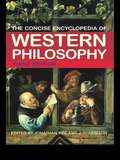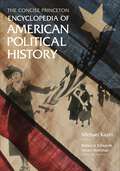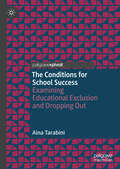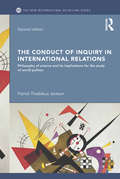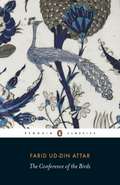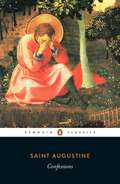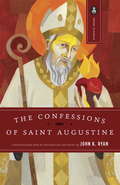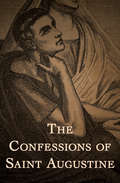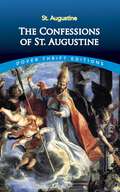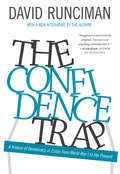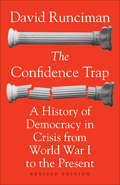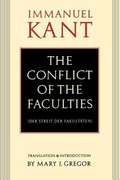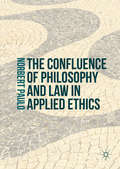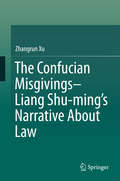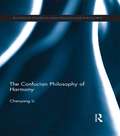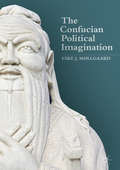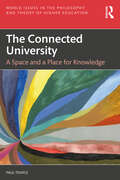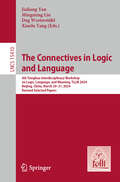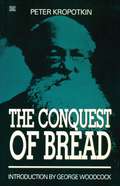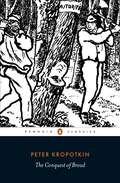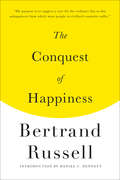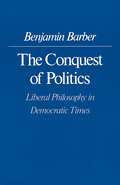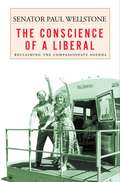- Table View
- List View
The Concise Encyclopedia of Western Philosophy
by J. O. Urmson Jonathan RéeOn its first appearance in 1960, the Concise Encyclopedia of Western Philosophy established itself as a classic; this third edition builds on its original strengths but brings it completely up to date. The Concise Encyclopedia offers a lively, readable, comprehensive and authoritative treatment of Western philosophy as a whole, incorporating scintillating articles by many leading philosophical authors. It serves not only as a convenient reference work, but also as an engaging introduction to philosophy.
The Concise Princeton Encyclopedia of American Political History
by Michael Kazin Rebecca Edwards Adam RothmanAn essential guide to U.S. politics, from the founding to todayWith 150 accessible articles written by more than 130 leading experts, this essential reference provides authoritative introductions to some of the most important and talked-about topics in American history and politics, from the founding to today. Abridged from the acclaimed Princeton Encyclopedia of American Political History, this is the only single-volume encyclopedia that provides comprehensive coverage of both the traditional topics of U.S. political history and the broader forces that shape American politics--including economics, religion, social movements, race, class, and gender. Fully indexed and cross-referenced, each entry provides crucial context, expert analysis, informed perspectives, and suggestions for further reading.Contributors include Dean Baker, Lewis Gould, Alex Keyssar, James Kloppenberg, Patricia Nelson Limerick, Lisa McGirr, Jack Rakove, Nick Salvatore, Stephen Skowronek, Jeremi Suri, Julian Zelizer, and many more.Entries cover:Key political periods, from the founding to todayPolitical institutions, major parties, and founding documentsThe broader forces that shape U.S. politics, from economics, religion, and social movements to race, class, and genderIdeas, philosophies, and movementsThe political history and influence of geographic regions
The Conditions for School Success: Examining Educational Exclusion and Dropping Out
by Aina TarabiniThis book analyses the role played by schools themselves in the high rates of educational exclusion and dropping out that affects many European education systems. The author frames the analysis according to three aspects of justice – redistribution, recognition and care – to explore both how teachers explain and react to the processes of educational failure and early school leaving, and how young people make sense and cope with the same failures. Using extensive qualitative data from schools in the Barcelona area, the author analyses the impact of school segregation, methods for managing diversity and teaching expectations: and subsequently how they can contribute to the production and reproduction of the risks of failure and ESL in contemporary education systems. This book will be of interest and value to students and scholars of educational exclusion, as well as school leaders.
The Conduct of Inquiry in International Relations: Philosophy of Science and Its Implications for the Study of World Politics (New International Relations)
by Patrick Thaddeus JacksonThe Conduct of Inquiry in International Relations first edition was winner of the ISA-Northeast’s Yale H. Ferguson Award, and the ISA Theory Section’s Best Book of the Year award. The Conduct of Inquiry in International Relations provides an introduction to the philosophy of science issues and their implications for the study of global politics. The author draws attention to the problems caused by the misleading notion of a single unified scientific method, and proposes a framework that clarifies the variety of ways that IR scholars establish the authority and validity of their empirical claims. Jackson connects philosophical considerations with concrete issues of research design within neopositivist, critical realist, analyticist, and reflexive approaches to the study of world politics. Envisioning a pluralist science for a global IR field, this volume organizes the significant differences between methodological stances so as to promote internal consistency, public discussion, and worldly insight as the hallmarks of any scientific study of world politics. In this second edition, Jackson has centralised the philosophical history of the ‘science question’ into a single chapter, providing a clearer picture of the connections between contemporary concerns about the status of knowledge and classic philosophical debates about the relationship between human beings and the world they inhabit. The central chapters feature more detailed and pedagogically useful illustrations of the methodological positions discussed, making the book even better suited to clarify the philosophical distinctions with respect to which a scientific researcher must locate herself. The second edition will continue to be essential reading for all students and scholars of International Relations, Political Science and Philosophy of Science.
The Conference of the Birds
by Farid AttarComposed in the twelfth century in north-eastern Iran, Attar's great mystical poem is among the most significant of all works of Persian literature. A marvellous, allegorical rendering of the Islamic doctrine of Sufism - an esoteric system concerned with the search for truth through God - it describes the consequences of the conference of the birds of the world when they meet to begin the search for their ideal king, the Simorgh bird. On hearing that to find him they must undertake an arduous journey, the birds soon express their reservations to their leader, the hoopoe. With eloquence and insight, however, the hoopoe calms their fears, using a series of riddling parables to provide guidance in the search for spiritual truth. By turns witty and profound, The Conference of the Birds transforms deep belief into magnificent poetry.
The Confessions of Jean-Jacques Rousseau
by Jean-Jacques Rousseau J. M. CohenWidely regarded as the first modern autobiography, The Confessionsis an astonishing work of acute psychological insight. Jean-Jacques Rousseau (1712-78) argued passionately against the inequality he believed to be intrinsic to civilized society. In his Confessions he relives the first fifty-three years of his radical life with vivid immediacy - from his earliest years, where we can see the source of his belief in the innocence of childhood, through the development of his philosophical and political ideas, his struggle against the French authorities and exile from France following the publication of Emile. Depicting a life of adventure, persecution, paranoia, and brilliant achievement, The Confessionsis a landmark work by one of the greatest thinkers of the Enlightenment, which was a direct influence upon the work of Proust, Goethe and Tolstoy among others.
The Confessions of Saint Augustine
by Saint Augustine R. S. Pine-CoffinIn his 1500-year-old Confessions, Augustine of Hippo tells the story of his remarkable life, interwoven with his insights of endless wisdom. Noted Paul VI: 'all of antiquity's philosophy converges in his work.'
The Confessions of Saint Augustine
by Saint AugustineConfessions of Augustine written by legendary philosopher and theologian Saint Augustine is an autobiographical work which is widely considered to be one of the greatest books of all time. This great classic will surely attract a whole new generation of readers. For many, Confessions of Augustine is required reading for various courses and curriculums. And for others who simply enjoy reading timeless pieces of classic literature, this gem by Saint Augustine is highly recommended. Published by Classic Books America and beautifully produced, Confessions of Augustine would make an ideal gift and it should be a part of everyone's personal library.
The Confessions of Saint Augustine
by Saint AugustineThe world’s most famous spiritual autobiography Written between 397 and 398 CE, The Confessions of Saint Augustine is the story of Augustine of Hippo’s childhood in Numidia, his youth and early adulthood in Carthage, Rome, and Milan, and his conversion to Christianity. As he struggled to liberate himself from his sinful past, Augustine embarked on a quest that would transform him into one of the most influential religious thinkers of all time. A moving testament to the power of faith and an inspirational guide to a fulfilled life, The Confessions of Saint Augustine is a masterwork of Western literature. This ebook has been professionally proofread to ensure accuracy and readability on all devices.
The Confessions of Saint Augustine
by St. Augustine"The reader who has never met Augus-tine before ought to go first of all to the Confessions," reflected the Trappist monk and scholar Thomas Merton. "Augustine lived the theology that he wrote. . . . He experienced the reality of Christ living in his own soul." Saint Augustine, the celebrated theologian who served as Bishop of Hippo from a.d. 396 until his death in a.d. 430, is widely regarded as one of the most influential thinkers in the Western world. Written in the form of a long prayer addressed directly to God, Augustine's Confessions, the remarkable chronicle of his conversion to Christianity, endures as the greatest spiritual autobiography of all time. "Augustine possessed a strong, capacious, argumentative mind," wrote Edward Gibbon. "He boldly sounded the dark abyss of grace, predestination, free-will, and original sin." And the eminent historian Jaroslav Pelikan remarked: "There has, quite literally, been no century of the sixteen centuries since the conversion of Augustine in which he has not been a major intellectual, spiri-tual, and cultural force."From the Hardcover edition.
The Confessions of St. Augustine (Dover Thrift Editions)
by St. AugustineMore than an autobiography, The Confessions of St. Augustine is one of the most influential religious books in the Christian tradition. A great work of Western literature, it recalls crucial events and episodes in the author's life, in particular, life with his devoutly Christian mother and his origins in rural Algeria in the mid-fourth century A.D.; the rise to a lavish life at the imperial court in Milan; his struggle with sexual desires; eventual renunciation of secular ambitions and marriage; and recovery of his Catholic faith.This intensely personal narrative — among the first in which self-analysis was used to describe spiritual and emotional experiences — provides a detailed, classic recounting of one man's internal struggles and religious conversion. The book will be useful to anyone interested in the impact made by one of the foremost leaders in the development of Christian thought.
The Confidence Trap
by David RuncimanWhy do democracies keep lurching from success to failure? The current financial crisis is just the latest example of how things continue to go wrong, just when it looked like they were going right. In this wide-ranging, original, and compelling book, David Runciman tells the story of modern democracy through the history of moments of crisis, from the First World War to the economic crash of 2008. A global history with a special focus on the United States, The Confidence Trap examines how democracy survived threats ranging from the Great Depression to the Cuban missile crisis, and from Watergate to the collapse of Lehman Brothers. It also looks at the confusion and uncertainty created by unexpected victories, from the defeat of German autocracy in 1918 to the defeat of communism in 1989. Throughout, the book pays close attention to the politicians and thinkers who grappled with these crises: from Woodrow Wilson, Nehru, and Adenauer to Fukuyama and Obama. The Confidence Trap shows that democracies are good at recovering from emergencies but bad at avoiding them. The lesson democracies tend to learn from their mistakes is that they can survive them--and that no crisis is as bad as it seems. Breeding complacency rather than wisdom, crises lead to the dangerous belief that democracies can muddle through anything--a confidence trap that may lead to a crisis that is just too big to escape, if it hasn't already. The most serious challenges confronting democracy today are debt, the war on terror, the rise of China, and climate change. If democracy is to survive them, it must figure out a way to break the confidence trap.
The Confidence Trap: A History of Democracy in Crisis from World War I to the Present
by David RuncimanWhy do democracies keep lurching from success to failure? The current financial crisis is just the latest example of how things continue to go wrong, just when it looked like they were going right. In this wide-ranging, original, and compelling book, David Runciman tells the story of modern democracy through the history of moments of crisis, from the First World War to the economic crash of 2008. A global history with a special focus on the United States, The Confidence Trap examines how democracy survived threats ranging from the Great Depression to the Cuban missile crisis, and from Watergate to the collapse of Lehman Brothers. It also looks at the confusion and uncertainty created by unexpected victories, from the defeat of German autocracy in 1918 to the defeat of communism in 1989. Throughout, the book pays close attention to the politicians and thinkers who grappled with these crises: from Woodrow Wilson, Nehru, and Adenauer to Fukuyama and Obama. In The Confidence Trap, David Runciman shows that democracies are good at recovering from emergencies but bad at avoiding them. The lesson democracies tend to learn from their mistakes is that they can survive them—and that no crisis is as bad as it seems. Breeding complacency rather than wisdom, crises lead to the dangerous belief that democracies can muddle through anything—a confidence trap that may lead to a crisis that is just too big to escape, if it hasn't already. The most serious challenges confronting democracy today are debt, the war on terror, the rise of China, and climate change. If democracy is to survive them, it must figure out a way to break the confidence trap.
The Conflict of the Faculties
by Immanuel Kant Mary J. Gregor<p>It is in the interest of the totalitarian state that subjects not think for themselves, much less confer about their thinking. Writing under the hostile watch of the Prussian censorship, Immanuel Kant dared to argue the need for open argument, in the university if nowhere else. In this heroic criticism of repression, first published in 1798, he anticipated the crises that endanger the free expression of ideas in the name of national policy. <p>Composed of three sections written at different times, <i>The Conflict of the Faculties</i> dwells on the eternal combat between the "lower" faculty of philosophy, which is answerable only to individual reason, and the faculties of theology, law, and medicine, which get "higher" precedence in the world of affairs and whose teachings and practices are of interest to the government. Kant makes clear, for example, the close alliance between the theological faculty and the government that sanctions its teachings and can resort to force and censorship. All the more vital and precious, then, the faculty of philosophy, which encourages independent thought before action. The first section, "The Conflict of the Philosophy Faculty with the Theology Faculty," is essentially a vindication of the right of the philosophical faculty to freedom of expression. In the other sections the philosopher takes a long and penetrating look at medicine and law, the one preserving the physical "temple" and the other regulating its actions.</p>
The Confluence of Philosophy and Law in Applied Ethics
by Norbert PauloThe law serves a function that is not often taken seriously enough by ethicists, namely practicability. A consequence of practicability is that law requires elaborated and explicit methodologies that determine how to do things with norms. This consequence forms the core idea behind this book, which employs methods from legal theory to inform and examine debates on methodology in applied ethics, particularly bioethics. It is argued that almost all legal methods have counterparts in applied ethics, which indicates that much can be gained from comparative study of the two. The author first outlines methods as used in legal theory, focusing on deductive reasoning with statutes as well as analogical reasoning with precedent cases. He then examines three representative kinds of contemporary ethical theories, Beauchamp and Childress's principlism, Jonsen and Toulmin's casuistry, and two versions of consequentialism--Singer's preference utilitarianism and Hooker's rule-consequentialism--with regards to their methods. These examinations lead to the Morisprudence Model for methods in applied ethics.
The Confucian Misgivings--Liang Shu-ming’s Narrative About Law
by Zhangrun XuThe major intellectual interest throughout this book is to offer a study on China's legal legacy, through Liang Shu-ming's eyes. The book follows the formula of the parallel between Life and Mind (人生与人心), Physis and Nomos, and compares Liang Shu-ming's narrative with his own practical orientation and with the theories of other interlocutors. The book puts Liang Shu-ming into the social context of modern Chinese history, in particular, the context of the unprecedented crisis of meaning in the legal realm and the collapse of a transcendental source for Chinese cultural identity in the light of modernity. The evaluation provided by this narrative could be helpful in clarifying the deep structures and significance of the present Chinese legal system through historically exploring Liang Shu-ming's misgivings. The book is intended for academics of legal, history and cultural studies. The book is unique in that it is the first book to explore New Confucian's considerations on reconstruction of Chinese legal system in the modern era. It presents a comprehensive systematical comparison of Liang Shu-ming's narrative about constitutional government in China against other schools of thought.
The Confucian Philosophy of Harmony
by Chenyang LiHarmony is a concept essential to Confucianism and to the way of life of past and present people in East Asia. Integrating methods of textual exegesis, historical investigation, comparative analysis, and philosophical argumentation, this book presents a comprehensive treatment of the Confucian philosophy of harmony. The book traces the roots of the concept to antiquity, examines its subsequent development, and explicates its theoretical and practical significance for the contemporary world. It argues that, contrary to a common view in the West, Confucian harmony is not mere agreement but has to be achieved and maintained with creative tension. Under the influence of a Weberian reading of Confucianism as "adjustment" to a world with an underlying fixed cosmic order, Confucian harmony has been systematically misinterpreted in the West as presupposing an invariable grand scheme of things that pre-exists in the world to which humanity has to conform. The book shows that Confucian harmony is a dynamic, generative process, which seeks to balance and reconcile differences and conflicts through creativity. Illuminating one of the most important concepts in Chinese philosophy and intellectual history, this book is of interest to students of Chinese studies, history and philosophy in general and eastern philosophy in particular.
The Confucian Political Imagination
by Eske J. MøllgaardThis book critically examines the Confucian political imagination and its influence on the contemporary Chinese dream of a powerful China. It views Confucianism as the ideological supplement to a powerful state that is challenging Western hegemony, and not as a political philosophy that need not concern us. Eske Møllgaard shows that Confucians, despite their traditionalist ways, have the will to transform the existing socio-ethical order. The volume discusses the central features of the Confucian political imaginary, the nature of Confucian discourse, Confucian revivals, Confucian humanism and civility, and the political ideal of the Great Unity. It concludes by considering if Confucianism can be universalized as an ideology in competition with liberal democracy.
The Connected University: A Space and a Place for Knowledge (World Issues in the Philosophy and Theory of Higher Education)
by Paul TempleUniversities are primarily social institutions, but they are also physical, material structures. This book bridges this divide by examining the links between the two and explores how good connectivity can result in a more effective university.Through an original study of connectivity in university design, Paul Temple explores what it is, why it’s important, and how it works. Using case studies and practical examples to examine the nature of social and material interactions, this book reviews what is known about connectivity and how it can be used to enhance academic effectiveness.This book will be of interest to academics, students, and researchers interested in higher education theory and practice, the philosophy of higher education, and those working at the interface between higher education studies and architecture and design.
The Connectives in Logic and Language: 4th Tsinghua Interdisciplinary Workshop on Logic, Language, and Meaning, TLLM 2024, Beijing, China, March 29–31, 2024, Revised Selected Papers (Lecture Notes in Computer Science #15410)
by Mingming Liu Dag Westerståhl Jialiang Yan Xiaolu YangEdited in collaboration with FoLLI, the Association of Logic, Language and Information, this book constitutes the refereed proceedings of the 4th Tsinghua Interdisciplinary Workshop on Logic, Language, and Meaning, TLLM 2024, held in Beijing, China during in March 29-31, 2024.The 8 full papers were carefully reviewed and selected from 49 submissions. This workshop also focused on the apparently simpler connectives expressing (various versions of) conjunction, disjunction, and negation.
The Conquest of Bread
by Peter KropotkinThe clearest statement of Kropotkin's anarchist social doctrines. In Kropotkin's own description, the book is "a study of the needs of humanity, and of the economic means to satisfy them."
The Conquest of Bread
by Peter Kropotkin'Well-being for all is not a dream.'In this brilliantly enjoyable, challenging rallying-cry of a book, Kropotkin lays out the heart of his anarchist beliefs - beliefs which surged around the world in the late 19th and early 20th centuries and which have a renewed relevance and poignancy today. Humane, thoughtful - but also a devastating critique of how modern society is organized (with the brutal, narrow few clinging onto their wealth and privileges at the expense of the many), The Conquest of Bread is a book to be argued over, again and again.
The Conquest of Happiness
by Bertrand Russell Daniel C. Dennett"Should be read by every parent, teacher, minister, and Congressman in the land."--The Atlantic In The Conquest of Happiness, first published by Liveright in 1930, iconoclastic philosopher Bertrand Russell attempted to diagnose the myriad causes of unhappiness in modern life and chart a path out of the seemingly inescapable malaise so prevalent even in safe and prosperous Western societies. More than eighty years later, Russell's wisdom remains as true as it was on its initial release. Eschewing guilt-based morality, Russell lays out a rationalist prescription for living a happy life, including the importance of cultivating interests outside oneself and the dangers of passive pleasure. In this new edition, best-selling philosopher Daniel C. Dennett reintroduces Russell to a new generation, stating that Conquest is both "a fascinating time capsule" and "a prototype of the flood of self-help books that have more recently been published, few of them as well worth reading today as Russell's little book."
The Conquest of Politics: Liberal Philosophy in Democratic Times
by Benjamin R. BarberThe description for this book, The Conquest of Politics: Liberal Philosophy in Democratic Times, will be forthcoming.
The Conscience of a Liberal: Reclaimingt he Compassionate Agenda
by Paul Wellstone"Never separate the lives you live from the words you speak," Paul Wellstone told his students at Carleton College, where he was professor of political science.Wellstone has lived up to his words as the most liberal man in the United States Senate, where for the past decade he has been the voice for improved health care, education, reform, and support for children. In this folksy and populist memoir, Wellstone explains why the politics of conviction are essential to democracy.Through humor and heartfelt stories, Paul Wellstone takes readers on an unforgettable journey (in a school bus, which he used to campaign for door-to-door) from the fields and labor halls of Minnesota to the U.S. Senate, where he is frequently Republican Majority Leader Trent Lott's most vocal nemesis. Along the way, he argues passionately for progressive activism, proves why all politics is personal, and explains why those with the deepest commitment to their beliefs win.
